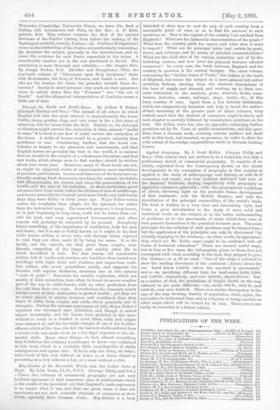Through the Stable and Saddle-Room. By Arthur T. Fisher. (Richard
Bentley and Son.)—The animal of all others in which English folk take the most interest is unquestionably the horse. Cattle, sheep, poultry, dogs, and cats come in for a fair share of attention, but the horse holds the field. Rightly so, for although civilisation might survive the extinction of other animals "useful to man," it is hard to see how it could survive the extinction of the horse. A strike of horses would be a greater calamity than pestilence or war. Considering, further, that the horse con- tributes so largely to our pleasures and amusements, and that English horses are probably the best in the world, it is natural that he should be the subject of a voluminous literature, and that new books, which always seem to find readers, should be written about him every year. Moreover, many of those books are not, as might be supposed, works of supererogation, mere repetitions of previous publications. Lovers and observers of the horse are con- tinually making fresh discoveries touching the animal, his habits and idiosyncrasies, his virtues and vices, the preservation of his health, and the cure of his maladies. In these particulars great advances have boon made within the lifetime of men of middle age, and horses generally are treated much more kindly and judiciously than they were thirty or forty years ago. Major Fisher writes rather for neophytes than adepts, for the ignorant few rather than the instructed many. The man who proposes to keep horses, or is just beginning to keep them, could not do better than con- sult his book, and oven experienced horsomasters and other exports will probably. be rewarded by its perusal. Everybody knows something of the importance of ventilation, both for man and horse ; but it is not so widely known as it ought to be, that while horses seldom or never take cold through being exposed to cold, they are often made ill by being too warm. It is the inside, not the outside, air that gives them coughs, sore- throats, congestion of the lungs, and sundry other ills to which horseflesh is heir. For this reason, old ramshackle stables, full of cracks and crevices; are healthier than brand-new buildings with tight doors and windows, and impervious roofs. Our author, who never generalises rashly, and supports his theories with copious instances, mentions one or two curious "cases in point." Remounts for cavalry regiments, which are mostly of Irish extraction, have often to travel in severe weather part of the way in cattle-trucks, with no other protection from the cold than their own coats. Nevertheless, the remounts nearly always arrive at their destination in perfect health ; yet they are no sooner placed in stables, however well ventilated, than they begin to suffer from coughs and colds, which generally end in strangles. During the autumn inano3uvres of 18M, Major Fisher's regiment Was encamped near Aldershot, and though it rained almost incessantly, and the horses were picketed in the open, without so much as a blanket to cover them, colds and coughs were unheard of, and the favourite charger of one of his brother- officers, which at the time she left the barrack-stable suffered from a severe cold, was made whole by a few days' exposure to the ele- mental strife. Many other things—in fact, almost everything that it behoves the ordinary horsekeeper to know—are contained in this book, which is a veritable little encyclopa3dia of stable management and equine lore. It lacks only one thing, an index; and a book of this sort without an index is, a times, almost as provoking as a lock without a key, or a maze without a clue.






































 Previous page
Previous page